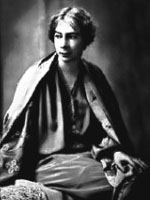Collected Poems of Sara Teasdale
Familiar only with her short lyrics, I did not know that Sara Teasdale attempted dramatic monologues in her early book Helen of Troy and Other Poems (1911). They are very readable though they are insufficiently dramatic. Marya Zaturenska, who wrote the insightful introduction, rightly describes Teasdale's work as poignant, but not tragic. Still, one comes across luminous passages like this one spoken by ill-fated Helen:
I will not give the grave my hands to hold,
My shining hair to light oblivion.
The great bulk of Collected Poems, however, comprises lyrics. Here are the anthology pieces such as "Coney Island" and "Let It Be Forgotten." Teasdale probably wrote too much and wrote too easily, for a lot of the work is unremarkable. Images of trees, flowers and birds abound. She achieves a more distinctive note when she turns to her contemporary life as an upper-middle-class woman for inspiration. So in the poem "Jewels" she compares turning her eyes from her lover to women putting away "The jewels they have worn at night/ And cannot wear in sober day." Another lyric "Thoughts" becomes the life lived in dressing rooms and nurseries.
When I can make my thoughts come forth
To walk like ladies up and down,
Each one puts on before the glass
Her most becoming hat and gown.
But oh, the shy and eager thoughts
That hide and will not get them dressed,
Why is it that they always seem
So much more lovely than the rest?
Teasdale stuck resolutely to traditional poetic forms and diction throughout her career. She liked some of the Modernists but was not influenced by them. "The Voice" is exceptional because it begins with a very modern juxtaposition of different kinds of diction.
Atoms as old as stars,
Mutation on mutation,
Millions and millions of cells
Dividing yet still the same,
From air and changing earth,
From ancient Eastern rivers,
From turquoise tropic seas,
Unto myself I came.
But it lapses into fusty Edwardian abstractions in the end, when the speaker hears the different voices of the atoms telling her, "Forever/ Seek for Beauty, she only/ Fights with man against Death!" She did not find her way out of her period style. She did not feel the need.



Comments